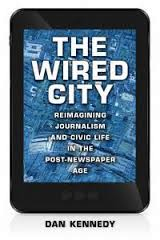
Local Journalism, Wired
By R. Alan Clanton | published Wednesday, January 1, 2014 |
Thursday Review Editor
A new book by Northeastern University journalism professor Dan Kennedy examines the challenges and struggles which face small online news ventures. The book, The Wired City: Reimagining Journalism and Civic Life in the Post-Newspaper Age, chronicles the day-to-day operations of one of the thousands of online journals which have sprung into existence over the last decade, most of the start-ups rising to fill a void left where traditional dailies—their business model essentially destroyed—no longer function effectively.
Smaller, independent start-ups also try to thrive where the non-traditional or alternative press has failed. Many cities have lost their edgy, sometimes combative secondary papers—typically weeklies or biweeklies—as ad dollars shrink. Kennedy knows firsthand about this; he was once a columnist for the recently shuttered Boston Phoenix, the iconic and fearless alt tabloid once profitable enough to keep the mainstream Boston Globe honest.
Kennedy takes the reader inside the operations of the New Haven Independent, a tiny journalistic site founded in the aught years and still struggling to find its profit center, and typical of hundreds of similar web-only newspapers all across the country. As might be expected, the variations and permutations of local and regional online news are limitless. Unlike the old traditional newspaper business model, online journalism can take a variety of forms—sponsored, with ads; subscriptions with full or limited access; per pay, per click; reader “membership” or reader “preferred access” status; through readers first having to watch ads, or navigate pop-ups; and some through a variety of donation-based funding, including crowd-sourcing and private donations.
Kennedy also steps outside of the Independent’s offices to have a look at similar small online operations in neighboring towns and cities in New England. Kennedy makes a strong case that the online press does, in fact, have an impact in many communities, and he seems to conclude that journalism—despite its current condition of low morale and outright retreat—cannot be fully snuffed out. Honest reporting will live on, even if the technology changes.
Published by the University of Massachussets Press, 2013
